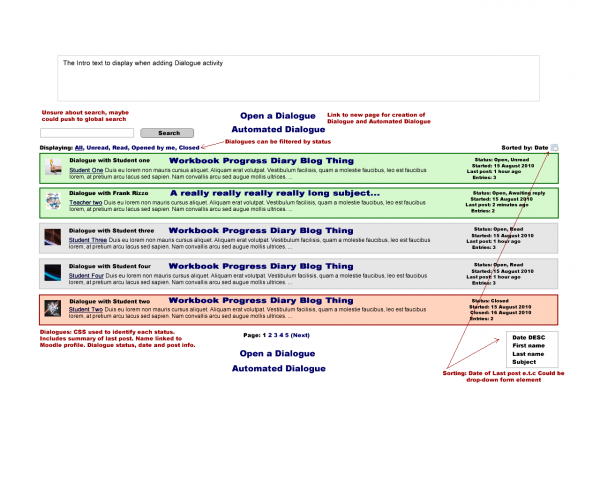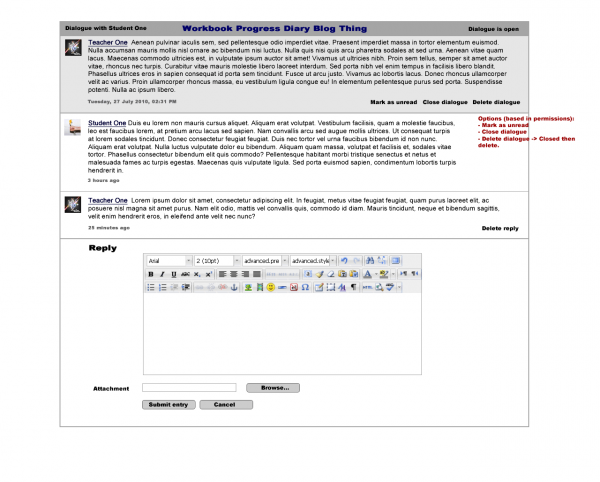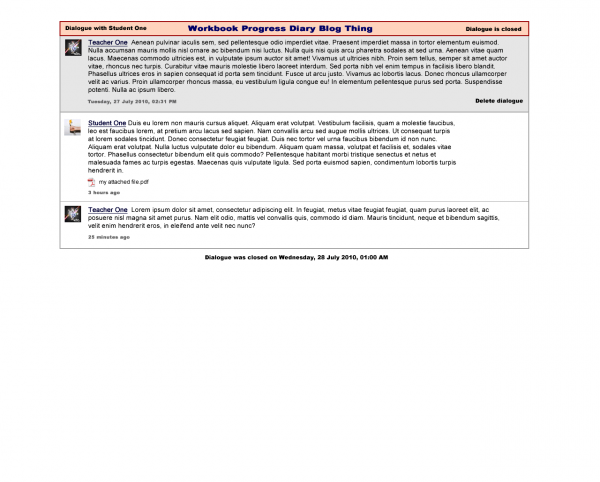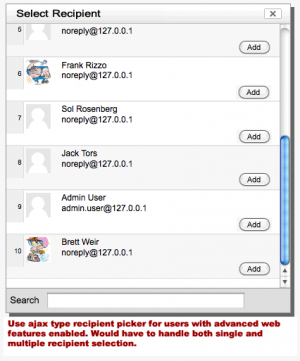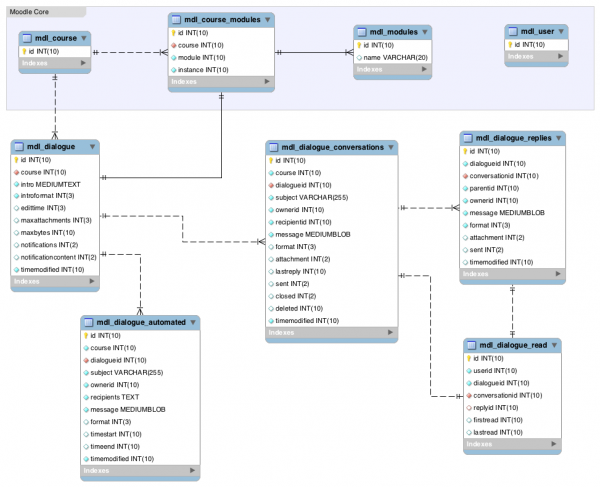Dialogue 2.0 specification
| Warning: This page is no longer in use. The information contained on the page should NOT be seen as relevant or reliable. |
This page tracks and summarises the progress of rewrite of the Dialogue module for Moodle 2.0. Moodle 2.0
| Dialogue 2.0 specification | |
|---|---|
| Status | Draft |
| Tracker | CONTRIB-2059 |
| Discussion | Review and comments |
Introduction
The Dialogue module allows students or teachers to start a two-way conversation with another person. The Dialogue is a course activity that can be useful when the teacher wants a place to give private feedback to a student on their online activity. For example, if a student is participating in a language forum and made a grammatical error that the teacher wants to point out without embarrassing the student, a dialogue is the perfect place. A dialogue activity would also be an excellent way for counselors within an institution to interact with students - all activities are logged and email is available but not necessarily required. The Dialogue is also a useful alternative to email or private Messages as the conversations are located within a course. The Dialogue module can be backed up with other course activities.
Usage scenarios
- Teacher posts the same message to all students in ‘Course A’, future enrolled students also receive the same message. Individual conversation created between teacher and each student. Multiple replies are allowed.
- Teacher posts the same message to all members of ‘Group A’, future group members also receive the same message. Individual conversation created between teacher and each user (any role) in ‘Group A’. Multiple replies are allowed.
- Teacher posts the same message to specific students in ‘Course A’. Individual conversation created between teacher and each student. Multiple replies are allowed.
- Teacher posts a message to a specific student in ‘Course A’. Individual conversation created between teacher and specific student . Student can view but not reply. Multiple followup replies are allowed for teacher.
- Student posts a message to a specific teacher in ‘Course A’. Individual conversation created between teacher and student. Multiple followup replies are allowed.
- Teacher A leaves, Teacher B needs to manage all conversations to allow followup replies, close and delete.
- Specific Student (eg Class Rep with own role) posts a message to all students in ‘Course A’. Individual conversation created between Class Rep and each student. Multiple followup replies are allowed.
- Specific Student (eg Class Rep with own role) posts a message to a specific student in ‘Course A’. Individual conversation created between Class Rep and specific student. Multiple followup replies are allowed.
- Specific Student posts a message into a specific role (eg Class Rep role). Individual conversation created between specific student and Class Rep. Multiple followup replies are allowed.
- All Teachers can view and participate in any existing conversation in a shared teaching situation.
Design goals
- Retain existing functionality.
- Enhance usage scenarios, flexibility and control.
- Enhance user interface.
Glossary
| Term | Definition |
|---|---|
| Dialogue | An instance of a dialogue activity module. |
| Conversation | An instance of communication between two users within a dialogue activity. Follow vertical linear pattern. |
| Reply | A message posted in reply to conversational text. |
User interface mock-ups
Dialogue listing
Dialogue view
Dialogue new
Recipient picker
Basic features Use a standard drop down for single recipient selection.
Multiple user selection
Use standard multiple user selection interface as found in enrol users, groups e.t.c
Advanced features Ajax recipient picker, must be able to handle both single and multiple recipient selection.
Implementation plan
Multiple dialogue open
If user has capability mod/dialogue:openmultiple with permission set to allow, they can select multiple users to open a conversation with that will contain the same subject, body, attachment(s).
Auto open multiple
If a user has the capability mod/dialogue:autoopenmultiple with permission set to allow, they can open a automated conversation that will contain the same subject, body, attachment(s) with:
- "All Participants" -> All course members
Any newly enrolled users will receive dialogue.
If in group mode
- "A Group" -> All members in that group.
- "Multiple Groups" -> e.g Group A, Group C will open with any member of a selected group.
Any new group member will receive dialogue.
Note: New capability mod/dialogue:receive will also determine what roles (student, teacher e.t.c) a user can open a dialogue with.
This information will be stored to a new table mdl_dialogue_automated this will allow user to delete conversation at anytime if they want to stop opening conversations with newly enrolled users or group members. Depending on time, could also add a date range option to control opening.
Group support
Visible groups mode
User will see all groups listed in the recipient picker. User can open a conversation with any user or group of users.
Separate groups mode
User will see groups they are a member of listed in the recipient picker. User can open a conversation with any user in a group they are a member of.
User with capability moodle/site:accessallgroups with permission allow will see all groups listed in the recipient picker and can open a conversation with any user regardless of group membership.
Note: New capability mod/dialogue:receive will also determine what roles (student, teacher e.t.c) a user can open a conversation with.
File attachments
File API
Use filemanager element in the formslib to get one or more file from user for each post, file(s) stored permanently for future viewing.
Notifications
Messaging API
Setup messageprovider for routing notifications.
Dialogue module instance options
The following options can be configured when creating a new dialogue module instance or updating/editing a dialogue module instance.
- Enable notifications
- Allow notifications, passed on to Messaging API.
- Include post content in notification
- If enabled notification will include post content and a link to specific dialogue conversation. If not enabled notification will include post title and a link to specific dialogue conversation.
Event API
user_enrolled()
- Can be used for any automated opening of dialogues for new course participants when all participants were selected in a multi-open dialogue.
groups_member_added()
- Can be used for any automated opening of dialogues for new group members when group(s) were elected in a multi-open dialogue.
user_unenrolled()
- Cleanup function, delete any dialogues that user is a recipient.
dialogue_extend_navigation($navref, $course, $module, $cm)
- Can use for dialogue unread count, filters(All, Unread, Read e.t.c) providing direct linking.
dialogue_extend_settings_navigation(settings_navigation $settingsnav, navigation_node $dialoguenode)
- Can use for showing automated open conversations
Logging
Dialogue events that will be logged.
- open
- view
- viewall - index
- reply
- edit
- close
- delete
Database structures
dialogue
| Field | Type | Default | Description | Notes |
|---|---|---|---|---|
| id | int (10) | auto-numbered | ||
| course | int (10) | 0 | the course id of this dialogue | |
| intro | text (medium) | the description/assignment of the dialogue | ||
| introformat | int (3) | 0 | the format of the intro field | |
| timemodified | int (10) | 0 | the timestamp when the module was modified | |
| edittime | int (10) | 0 | ||
| maxattachments | int (3) | 1 | number of attachments | |
| maxbytes | int (10) | 100000 | maximum size of the one attached file | |
| notifications | int (2) | 1 | allow post notifications, will use MessagingAPI | |
| notificationcontent | int (2) | 0 | include post content in notification |
dialogue_conversations
| Field | Type | Default | Description | Notes |
|---|---|---|---|---|
| id | int (10) | auto-numbered | ||
| course | int (10) | 0 | the course id this dialogue | |
| dialogueid | int (10) | 0 | the dialogue instance id | |
| subject | varchar (255) | brief summary of message | ||
| ownerid | int (10) | 0 | user id of person who started conversation | |
| recipientid | int (10) | 0 | user id of person who is to receive conversation | |
| message | text (medium) | message text | ||
| format | int (3) | 0 | the format type of message | |
| attachment | int (2) | 0 | if post contains attachment(s) | |
| lastreply | int (2) | 0 | reply id of last post in the conversation | |
| sent | int (10) | 0 | flag to indicate if message has been sent to recipient, date sent | |
| closed | int (10) | 0 | flag to indicate if conversation has been closed, date closed | |
| deleted | int (10) | 0 | flag to indicate conversation as deleted | Keep, retrieve only conversations not marked as deleted? date deleted |
| timemodified | int (10) | 0 | the timestamp when the module was modified |
dialogue_replies
| Field | Type | Default | Description | Notes |
|---|---|---|---|---|
| id | int (10) | auto-numbered | ||
| conversationid | int (10) | 0 | the conversation id that reply relates to. | |
| parentid | int (10) | 0 | the previous reply if exists, else if 0 directly follows conversation | |
| ownerid | int (10) | 0 | user id of person who posted reply | |
| message | text (medium) | message text | ||
| format | int (3) | 0 | the format type of message | |
| attachment | int (2) | 0 | if post contains attachment(s) | |
| sent | int (2) | 0 | flag to indicate if message has been sent to recipient | |
| timemodified | int (10) | 0 | the timestamp when the module was modified |
dialogue_read
| Field | Type | Default | Description | Notes |
|---|---|---|---|---|
| id | int (10) | auto-numbered | ||
| userid | int (10) | 0 | user id of person who viewed conversation or reply | |
| dialogueid | int (10) | 0 | the dialogue id that the conversation relates to. | |
| conversationid | int (10) | 0 | the conversation id that reply relates to | |
| replyid | int (10) | 0 | the reply id, can be 0 if user has just viewed start of conversation | |
| firstread | int (10) | 0 | datetime first read | |
| lastread | int (10) | 0 | datetime last read |
dialogue_automated
| Field | Type | Default | Description | Notes |
|---|---|---|---|---|
| id | int (10) | auto-numbered | ||
| course | int (10) | 0 | the course id this dialogue | |
| dialogueid | int (10) | 0 | the dialogue instance id | |
| subject | varchar (255) | brief summary of message | ||
| ownerid | int (10) | 0 | user id of person who started conversation | |
| recipients | text (small) | 0 | indicators for "All participants" or selected groups | serialised array or object |
| message | text (medium) | message text | ||
| format | int (3) | 0 | the format type of message | |
| timestart | int (10) | 0 | the datetime start range, users enrolled after will receive | later implementation |
| timeend | int (10) | 0 | the datetime end range, users enrolled before will receive | later implementation |
| timemodified | int (10) | 0 | the timestamp when the module was modified |
Capabilities and Permissions
| Capability | Description | Role permissions(defaults) | Notes |
|---|---|---|---|
| mod/dialogue:open | Open a dialogue with single recipient | teacher | |
| mod/dialogue:receive | Can receive a dialogue | student | Can be used to control what roles are displayed in the recipient picker |
| mod/dialogue:reply | Can reply to a dialogue | teacher, student | |
| mod/dialogue:closeown | Can close a dialogue if have ownership | teacher, student | |
| mod/dialogue:deleteown | Can delete a dialogue if have ownership | teacher, student | |
| mod/dialogue:deleteownreply | Can delete own reply | teacher, student | Add ability to delete last reply in dialogue thread. Maybe/Maybe not? |
| mod/dialogue:openmultiple | Can start a dialogue with multiple recipients | teacher | For sending the same dialogue to multiple recipients. Used for targeting particular group(s) of users or whole class. |
| mod/dialogue:autoopenmultiple | Can start a automated dialogue with course participants or group members which includes future members. | teacher | |
| mod/dialogue:viewany | view any conversation, reply | administrator | |
| mod/dialogue:replyany | can reply in any conversation to any reply | administrator | |
| mod/dialogue:closeany | can close any conversation | administrator | |
| mod/dialogue:deleteany | can delete any conversation | administrator |
Backup and Restore
Create backup and restore functions under 2.0
1.9x Restoring a 1.9x backup into a 2.0 Moodle? TO-DO
Upgrade Process
Will need to map existing table structure to new table structure once finalised.
Translations
Current 1.9x translations
- en English
- de Deutsch German
- es Español Spanish
- it Italiano Italian
Project schedule
Milestone 1
Date: 08/10/2010
Goal: The specification is reviewed and agreed on by the community. The implementation plan is transferred into sub-tasks in the tracker
